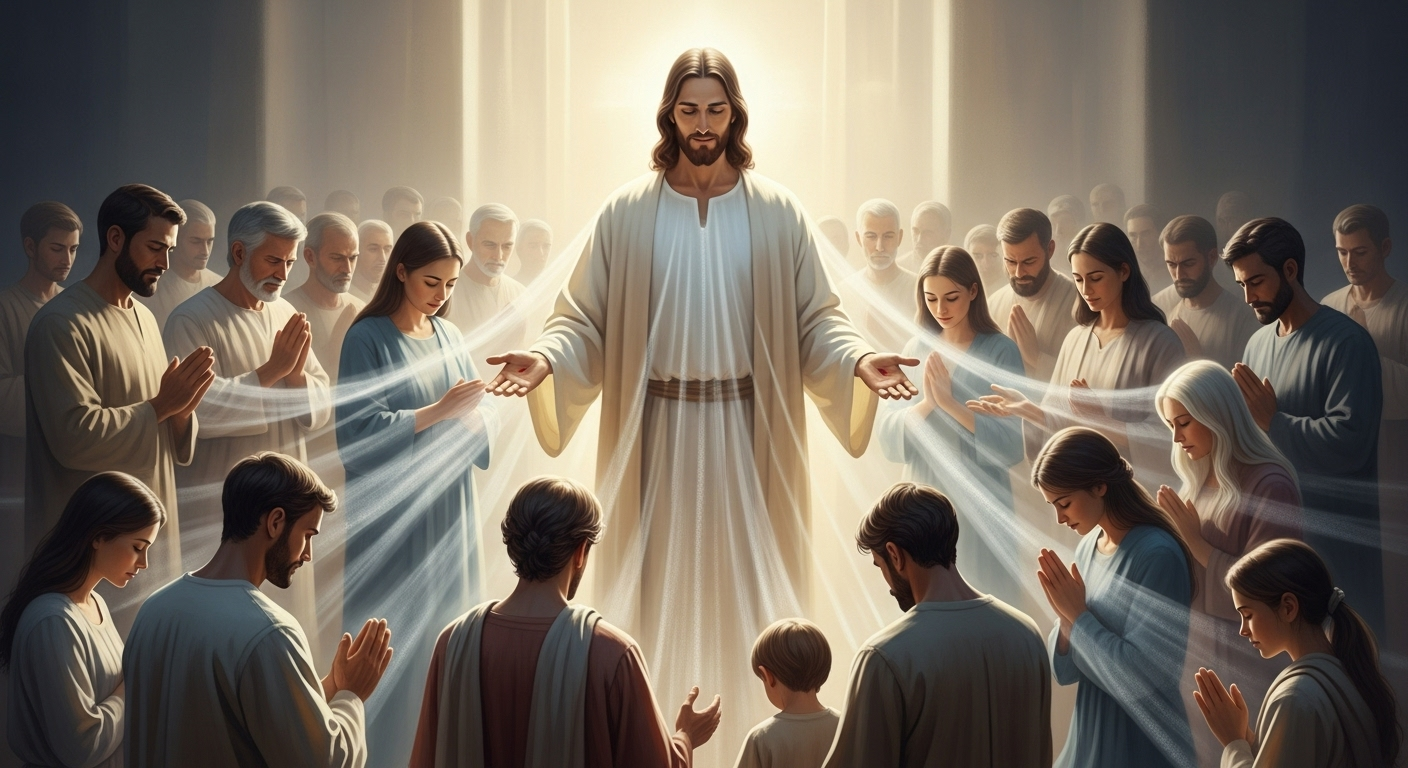In a biblical context, anointing is the sacred act of applying oil to a person or object to symbolize being set apart for a holy purpose. Spiritually, ‘the anointing’ refers to the empowerment and presence of the Holy Spirit upon a believer, equipping them for a specific calling or service, as perfectly exemplified by Jesus Christ, the ‘Anointed One’ or Messiah.
Have you ever sensed a profound spiritual empowerment—a divine touch that enables you to do things beyond your natural ability? Or perhaps you’ve heard the term “the anointing” and wondered about its true significance. The Bible speaks of a special divine enablement, a sacred setting apart, that has impacted God’s people throughout history. This is more than a religious tradition; it is a tangible expression of God’s presence and power. This truth is rooted deeply in the identity and work of our Lord and Savior, Jesus Christ.
Here at Just Jesus Time, we believe in the transformative power of God’s Word. This article will help demystify “the anointing” by guiding you through a biblical exploration of its meaning, purpose, and power for every Christian. We will trace this concept from its ancient origins to its ultimate fulfillment in Jesus. Then, we will explore how it continues to empower believers today through the Holy Spirit. Our goal is to build your faith, provide clear understanding, and encourage you to embrace the spiritual gifts and calling God has for you.
Let’s begin with a foundational understanding of what this spiritual concept truly means. We will delve into the term’s rich Hebrew roots, which speak of consecration and being set apart for God’s holy purposes.
What is the spiritual meaning of anointing?

The Hebrew Meaning: To Consecrate and Set Apart
In the Bible, the concept of “anointing” carries profound spiritual weight, with roots tracing back to the Old Testament. The primary Hebrew word for this practice is mashach (מָשַׁח), which literally means “to smear” or “to rub with oil” [source: Blue Letter Bible: H4886 – mashach – Strong’s Hebrew Lexicon: https://www.blueletterbible.org/lexicon/h4886/kjv/wlc/0-1/].
However, the spiritual significance of anointing extends far beyond the physical act. To anoint a person or object was to consecrate it—a declaration that it was set apart for God’s holy purpose. This act designated a special relationship with the Almighty.
For instance, priests were anointed to serve in the Tabernacle (Exodus 29:7), kings were anointed as a sign of their divine appointment to lead (1 Samuel 10:1), and prophets were anointed for their sacred calling (1 Kings 19:16). Even sacred objects, such as the Tabernacle and its furnishings, were anointed to make them holy for worship (Exodus 30:26-29).
Therefore, the spiritual meaning of anointing is clear: it signifies dedication, holiness, and divine authorization. It marks a separation from the common, setting something or someone apart for God’s exclusive use and glory.
An Outward Sign of an Inward Calling
The act of anointing with oil was never merely a ritual. Instead, it served as a powerful outward symbol of a deeper, inward spiritual reality: God’s choice and empowerment. When someone was anointed, it signified that God’s Spirit was coming upon them, and this divine presence equipped them for their God-given task.
Consider the example of David. After the prophet Samuel anointed him with oil (1 Samuel 16:13), the scripture says, “the Spirit of the Lord came mightily upon David from that day forward.” This anointing was more than a coronation; it was a tangible sign of God’s Spirit empowering David to fulfill his calling as king.
In the New Covenant, the emphasis shifts from the physical to the spiritual. While anointing with oil still occurs, the ultimate anointing is the outpouring of the Holy Spirit. Jesus Himself is “the Christ,” a title meaning “the Anointed One.” Anointed by the Holy Spirit without measure (John 3:34), He came to preach good news “because the Lord has anointed me” (Isaiah 61:1, Luke 4:18).
Through Jesus Christ, every believer now receives a spiritual anointing from the Holy Spirit. This anointing marks us as belonging to God and empowers us for our unique purpose. It is God’s seal upon our lives, confirming our inward calling (2 Corinthians 1:21-22).
What does the Bible say about anointing?
Anointing in the Old Testament: Kings, Priests, and Prophets
Anointing, the act of pouring oil over someone’s head, holds deep significance in the Bible. More than a mere ritual, it served as a powerful, visible symbol of divine selection.
In the Old Testament, anointing marked an individual as chosen and consecrated by God for a special office. This sacred act set people apart for His service.
- Kings: God chose kings to rule His people. Their anointing symbolized the Holy Spirit empowering them for leadership. For example, the prophet Samuel anointed Saul as the first king of Israel (1 Samuel 10:1). Later, David, a man after God’s own heart, was also anointed by Samuel (1 Samuel 16:13). This divine act marked the transfer of authority.
- Priests: Priests served as mediators between God and His people. Aaron and his sons were anointed to consecrate them for their holy duties (Exodus 29:7, Leviticus 8:12). This anointing sanctified them, enabling them to perform sacrifices and intercede for the Israelites in the Tabernacle.
- Prophets: While not always involving physical oil, the commissioning of prophets was equally divine. They were ‘anointed’ by God’s Spirit, empowering them to speak His truth and deliver His messages. For instance, Elijah was instructed to anoint Elisha as his prophetic successor (1 Kings 19:16).
Ultimately, the anointing designated these individuals as God’s representatives, granting them the authority and spiritual enablement to fulfill their God-given roles.
Anointing Sacred Objects for God’s Service
The practice of anointing also extended to inanimate objects. God commanded that various items be anointed to consecrate them for His exclusive use and holy service.
Under divine instruction, Moses anointed the Tabernacle and its furnishings, including the ark of the covenant, the altar, and all sacred vessels (Exodus 30:26-29). The purpose was to set them apart as holy, making them suitable for divine worship.
This act transformed ordinary materials into sacred instruments, dedicating them solely to God’s glory. It demonstrated God’s desire for holiness in all aspects of worship, requiring that every object used in His presence be consecrated to Him (Exodus 40:9-11).
Jesus Christ: The Ultimate ‘Anointed One’ (Messiah)
The Old Testament practice of anointing is a profound foreshadowing that points directly to Jesus Christ, the ultimate ‘Anointed One’. The Hebrew word ‘Messiah’ and the Greek word ‘Christ’ both mean “Anointed One,” titles that confirm His unique identity and mission.
Instead of being anointed with physical oil, Jesus received a far greater anointing from God the Father with the Holy Spirit. This occurred powerfully at His baptism, where the Holy Spirit descended upon Him like a dove (Matthew 3:16-17). This divine act publicly inaugurated His ministry, affirming His identity as the Son of God and beginning the direct fulfillment of prophecy (Isaiah 61:1).
Jesus perfectly embodies the roles foreshadowed by Old Testament anointing:
- The Perfect Prophet: Jesus spoke the very words of God (John 14:24), revealing divine truth and God’s will to humanity. He delivered the ultimate message of salvation and eternal life.
- The Perfect Priest: Unlike earthly priests who offered animal sacrifices repeatedly, Jesus offered Himself as the spotless Lamb of God (Hebrews 7:27). His single, perfect sacrifice atoned for all sin, once and for all. He is our High Priest, always interceding for us (Hebrews 4:14-16).
- The Perfect King: Jesus is not just a king but the King of kings and Lord of lords (Revelation 19:16). His kingdom is eternal and spiritual, and He reigns with ultimate authority over all creation (John 18:36-37).
In conclusion, Jesus Christ is the fulfillment of all anointing. As the divinely appointed Savior, His anointing by the Holy Spirit not only empowered His earthly ministry but also affirmed His identity as our perfect Prophet, Priest, and King. Through Him, believers receive access to God’s grace and power. The significance of “Messiah” as God’s chosen deliverer is foundational to Christian faith [1].
What is the power of anointing?

Empowerment by the Holy Spirit for Ministry
The anointing of God is not a passive experience but a dynamic empowerment. It is the Holy Spirit’s presence working through us, equipping believers for powerful service.
Jesus Himself demonstrated this truth, declaring that His mission was fueled by the anointing: "The Spirit of the Lord is upon Me, because He has anointed Me to preach the gospel to the poor; He has sent Me to heal the brokenhearted, to proclaim liberty to the captives and recovery of sight to the blind, to set at liberty those who are oppressed" (Luke 4:18).
Moreover, this power was not limited to Jesus. After His resurrection, He promised it to His followers: "You shall receive power when the Holy Spirit has come upon you; and you shall be witnesses to Me in Jerusalem, and in all Judea and Samaria, and to the end of the earth" (Acts 1:8). This divine anointing empowers us to carry out the Great Commission by sharing the Gospel effectively and ministering with supernatural authority. To this end, the Holy Spirit distributes various gifts, from teaching to healing, which are activated by His anointing (1 Corinthians 12:4-11).
Anointing for Healing and Deliverance (James 5:14)
A profound aspect of the anointing is its power to bring healing and deliverance. The Bible explicitly teaches that God desires His children to be whole, free from both sickness and spiritual oppression.
James 5:14 provides a clear instruction: "Is anyone among you sick? Let him call for the elders of the church, and let them pray over him, anointing him with oil in the name of the Lord." While the act of anointing with oil is a symbolic point of contact for faith, the power comes from God, not the oil itself. This demonstrates that healing is a divine work flowing from God’s compassion and power.
This anointing extends beyond physical ailments to bring deliverance from spiritual bondage. It is the power that casts out demons (Mark 16:17), breaks chains of addiction, and frees people from oppression. When we minister with the anointing, we witness God’s supernatural intervention, which brings freedom, hope, and wholeness to those held captive by spiritual darkness.
Breaking Yokes and Walking in Freedom (Isaiah 10:27)
The anointing also carries the power to break every yoke of bondage, a promise clearly found in Isaiah 10:27: "It shall come to pass in that day that his burden will be taken away from your shoulder, and his yoke from your neck, and the yoke will be destroyed because of the anointing oil." This scripture speaks of ultimate liberation.
In biblical terms, a "yoke" represents slavery, oppression, or any heavy burden—be it spiritual, emotional, or circumstantial—that restricts our freedom in Christ and prevents us from walking in God’s full purpose. The anointing of the Holy Spirit, however, dismantles these oppressive structures. It frees us from guilt, shame, and fear, breaking generational curses and strongholds.
Through the anointing, believers can walk in the true freedom Jesus declared: "If the Son makes you free, you shall be free indeed" (John 8:36). This freedom is not theoretical but a tangible reality for those who embrace God’s anointing. It empowers us to live victoriously, overcome sin, and resist temptation, enabling us to live a life consecrated to our Lord and Savior, Jesus Christ.
How do you activate the anointing?
Living a Life Consecrated to God
To walk in the anointing, we must first consecrate our lives to God. Consecration means being set apart for His holy purposes—a decision to dedicate ourselves fully to Him. This requires a daily surrender of our will, presenting our bodies as “a living sacrifice, holy and acceptable to God,” which the Bible calls our “spiritual worship” (Romans 12:1).
This consecrated lifestyle involves turning from sin and embracing the righteousness found in Christ. As the Bible calls us to be holy just as God is holy (1 Peter 1:15-16), living this way prepares our hearts to become vessels for the Holy Spirit’s work. In turn, this alignment with God’s will allows His power to flow through us unhindered.
The Role of Faith and Obedience
Faith is essential for activating the anointing because, without it, “it is impossible to please God” (Hebrews 11:6). This requires us to believe God has given us His Spirit and to trust He will empower us for His call. This is not a passive belief but an active trust in His promises.
Obedience works hand-in-hand with faith. As Jesus said, “If you love Me, keep My commandments” (John 14:15). Our obedience demonstrates both our love for God and our readiness to follow His lead. By obeying God’s Word, we open ourselves to His power, for the Holy Spirit is given “to those who obey Him” (Acts 5:32). Therefore, a life of active faith and unwavering obedience is key to allowing the anointing to flow powerfully through us.
Understanding The Anointing as a Grace from God
It is vital to understand that the anointing is a gift of God’s grace, not something we can earn through our own efforts. Grace is God’s unmerited favor, freely given through Jesus Christ. Just as salvation is a gift of grace through faith (Ephesians 2:8), the anointing also flows from this same divine source.
This means the anointing is not a reward for perfection but an empowerment for service, given to imperfect people who trust in a perfect Savior. Our focus, then, should be on drawing closer to God through prayer, worship, and His Word. As we deepen our relationship with Him, the anointing operates as a supernatural enablement from the Holy Spirit. This gift is rooted in the finished work of Jesus Christ, whose sacrifice on the cross made God’s grace and anointing available to us.
The Anointing We Receive Through Christ

Every Believer’s Anointing (1 John 2:20, 27)
In the Old Testament, anointing was a special consecration reserved for individuals like kings, priests, and prophets. Through Jesus Christ, however, God extended this blessing to all believers—a profound truth for every Christian. This anointing is the indwelling of the Holy Spirit.
The Apostle John clarifies this beautifully, writing, “But you have been anointed by the Holy One, and you all have knowledge” (1 John 2:20, ESV). He reiterates this promise: “But the anointing that you received from him abides in you, and you have no need that anyone should teach you. But as his anointing teaches you about everything, and is true, and is no lie—just as it has taught you, abide in him” (1 John 2:27, ESV).
This “anointing” is not physical oil but the Holy Spirit dwelling within us. This spiritual presence empowers believers by guiding our understanding of truth and connecting us intimately with God. From the moment of salvation, every Christian receives this divine anointing, which serves as God’s seal upon us, setting us apart for His purposes. [2]
This gift ensures we have direct access to divine wisdom, eliminating the need for human intermediaries to gain spiritual knowledge. The Holy Spirit acts as our teacher, revealing the truths of God’s Word and illuminating our path. This direct connection is a foundational aspect of our new life in Christ and affirms our identity as children of God.
Walking in Your God-Given Purpose
The anointing we receive through Christ is not merely for gaining knowledge; it is also for living with purpose. God has a unique, kingdom-aligned plan for every believer, and the Holy Spirit empowers us to fulfill this divine assignment.
This means we are fully equipped for service through a diversity of spiritual gifts, such as teaching, serving, prophesying, and administering. The Holy Spirit activates these gifts within us, enabling us to use them effectively for God’s glory (1 Corinthians 12:4-11).
Walking in your God-given purpose requires both faith and obedience, which involves listening to the Spirit’s leading. As He guides our daily lives and directs our steps, this anointing helps us overcome obstacles, gives us strength in weakness, and assures us of God’s constant presence.
Whether your purpose is sharing the Gospel, serving your community, or raising a godly family, the Spirit empowers you for the task. Therefore, embrace this divine anointing and step out in confidence. God has not only called you to a significant role but has also completely equipped you to fulfill it. You are anointed for His purpose.
Frequently Asked Questions About The Anointing
What is anointing according to the Bible?
In the Bible, anointing is far more than a mere ritual; it is a profound act of consecration and divine empowerment. At its core, anointing signifies that God has set someone or something apart for a specific purpose. It often symbolizes the presence and power of the Holy Spirit.
In the Old Testament, this anointing involved applying sacred oil to individuals or objects, representing God's chosen presence. For example, priests, kings, and prophets were anointed for their sacred offices (Exodus 29:7; 1 Samuel 10:1; 1 Kings 19:16). This act both marked them as dedicated to God's service and equipped them with the spiritual authority needed for their roles.
In the New Testament, the focus shifts from physical oil to its spiritual significance. The oil becomes a powerful symbol of the anointing by the Holy Spirit. Jesus Himself is the ultimate "Anointed One"—the Messiah, or "Christ" (John 1:41)—anointed with the Holy Spirit without measure (Acts 10:38). Through Christ, believers also receive this anointing, which is the indwelling of the Holy Spirit. This spiritual gift grants them understanding and empowers them for godly living (1 John 2:20, 27). Ultimately, biblical anointing is God's divine mark and equipping power at work in His people.
What are the three types of anointing?
While the anointing of the Holy Spirit comes from a single source, the Bible reveals its purpose in several different contexts. We can broadly understand these as three primary types:
- Old Testament Consecrational Anointing: This type involved the physical application of sacred oil to set apart individuals—such as kings, priests, and prophets—for their divine offices (Leviticus 8:12; 1 Samuel 16:13). Sacred objects and places were also anointed to dedicate them exclusively to God's service (Exodus 30:26-29). This anointing signified a divine appointment, marking them as holy and providing the spiritual authority for their tasks.
- The Anointing of Jesus Christ (The Messiah): Jesus is the supreme Anointed One, as His very title "Christ" means. He was anointed by God with the Holy Spirit and with power at His baptism (Luke 4:18; Acts 10:38), empowering His entire ministry to preach the good news, heal the sick, and set captives free. His anointing is unique and foundational, as He received the Spirit without limit (John 3:34).
- The Believer's Indwelling Anointing: Through faith in Jesus Christ, every believer receives an anointing from the Holy Spirit. This is not a partial anointing but the full indwelling of the Spirit Himself (1 John 2:20, 27). This inner anointing empowers us with spiritual understanding, guides us into truth, and equips us for ministry and service within the body of Christ. Ultimately, it enables us to live consecrated lives, set apart for God's purposes.
What is the purpose of the anointing?
The anointing serves several vital purposes, all centered on God's divine plan and the empowerment of His people.
- Consecration and Setting Apart: Primarily, the anointing consecrates or sets apart individuals and objects for God's holy use, signifying they are dedicated to His purposes and are therefore sacred (Exodus 40:13).
- Empowerment for Service and Ministry: The anointing provides the divine power needed for specific tasks. For instance, it equipped Old Testament prophets to speak God's word, kings to rule justly, and priests to mediate for the people. In the New Testament, this empowerment continues as the Holy Spirit anoints believers for various ministries and spiritual gifts (Acts 1:8; 1 Corinthians 12:4-11).
- Spiritual Understanding and Guidance: The anointing of the Holy Spirit acts as a divine teacher, reminding believers of God's Word and guiding them into all truth (John 14:26; 1 John 2:27). This inner guidance helps us discern God's will and understand Scripture.
- Healing and Restoration: The anointing is frequently associated with God's power to heal. For example, James 5:14 instructs believers to pray over the sick and anoint them with oil. This physical act symbolizes a complete reliance on God's power to restore a person's health.
- Deliverance and Breaking Bondage: The anointing carries the power to break spiritual yokes of oppression (Isaiah 10:27). As demonstrated in Jesus' ministry, it brings deliverance and sets people free from bondage (Luke 4:18-19). This power liberates individuals from sin, addiction, and spiritual darkness.
- Empowerment for Witness: The anointing equips believers to be effective witnesses for Jesus Christ (Acts 1:8). It provides the boldness and divine ability to share the gospel with conviction and power.
In summary, the anointing is a divine provision that enables and equips God's people to fulfill His calling, living lives that bring glory to Jesus Christ, our Lord and Savior.
